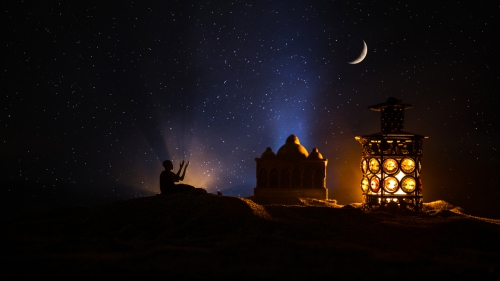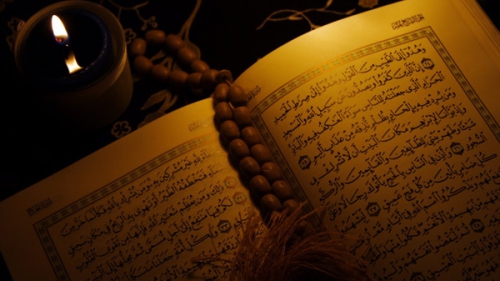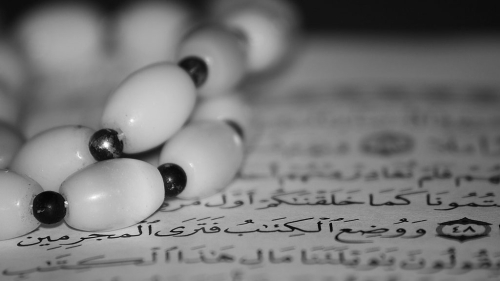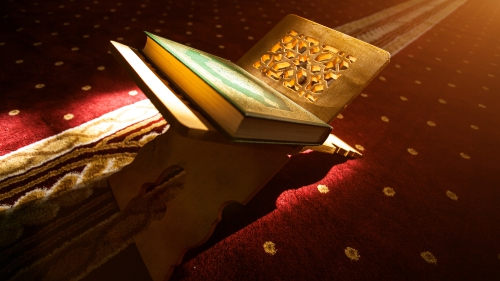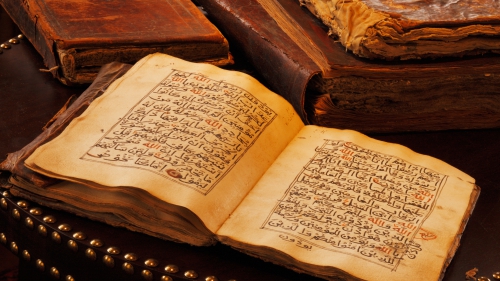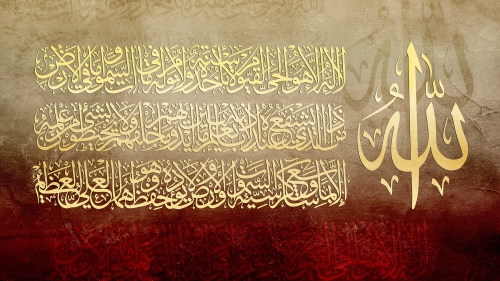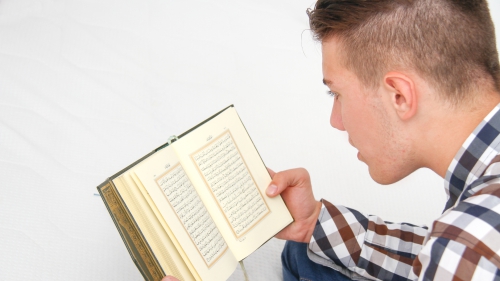Does the Quran or Prophet Muhammad (pbuh) promote violence?
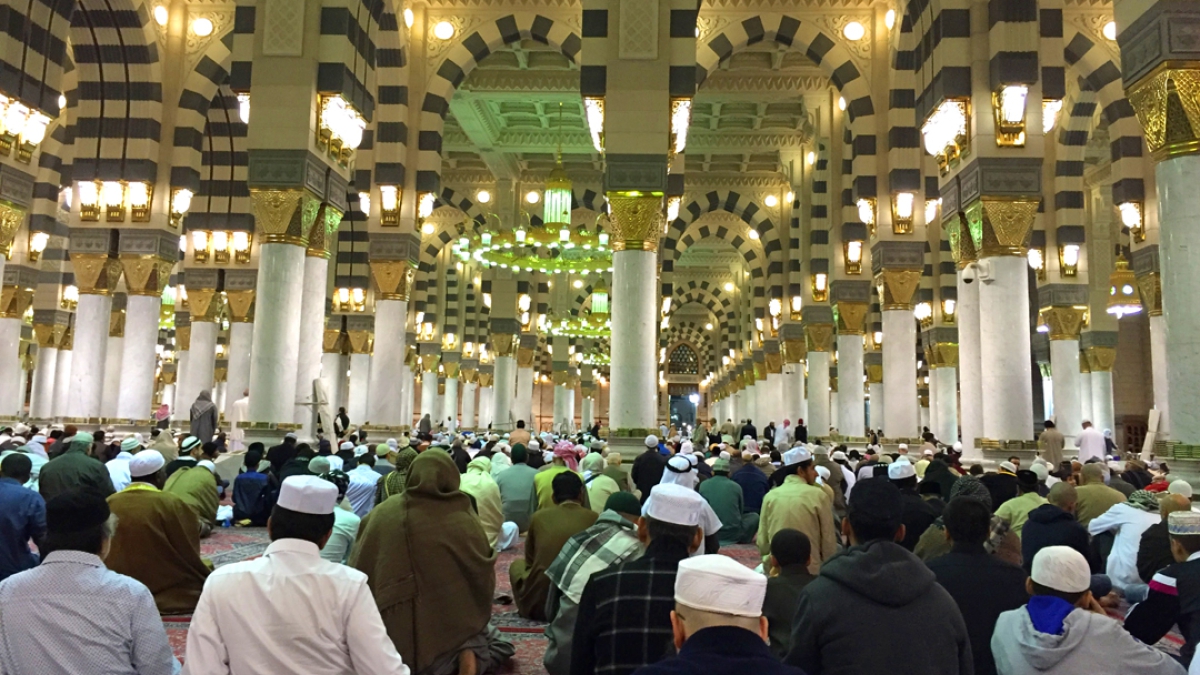
Some issues in peace and violence
In the aftermath of September 11 when President Bush visited the Islamic Center of Washington DC, both to reassure the Muslims in America and to create public awareness against prejudice, he remarked: "The face of terror is not the true faith of Islam. That's not what Islam is all about. Islam is peace." Of course, Bush is, first and foremost, a politician and therefore his remarks should be taken with a grain of salt - actually, a lot of salt.
The American President was quickly rebuffed even by a number of his compatriots, who vehemently disagreed with the President's diplomatic stance. "... a large number of foreign policy hawks -- some of them with advisory roles in the Bush administration -- have joined religious conservatives in taking issue with Bush's characterizations. ... they say the claim is dishonest and destined to fail." [Conservatives Dispute Bush Portrayal of Islam as Peaceful] A pro-Israel, conservative or neocon, Daniel Pipes, sermonized that since calls for "Death to America" in 1979 in Iran, "... some 600 Americans have been murdered by militant Muslims. And still the U.S. government fails to 'proclaim militant Islam our strategic enemy' but instead goes along with blandishments about 'good Muslims' and 'true Islam' being a religion of peace." [Militant Islam Is Still Enemy No.1]
In contrast to the above two categories of non-Muslim stance, there are two parallel camps within Muslims. One camp on the fringe has no qualms in taking a public position that Islam enjoins fighting and subduing the non-Muslims, and this is a sublime religious duty. They urge the Muslims to take up a combative struggle - armed if necessary - to resist the evil of the "infidels" (kuffar) and to facilitate Islam's victory over others. They cite the example of the Prophet as to how under his leadership the world of the unbelievers was subdued.
Repudiating this group of extremist Muslims, there is the broader Muslim community that finds an echo of their own position in what President Bush said and they would like the world to know that Islam means peace and Islam is peaceful. Period. This group is very much troubled by the hate-mongering and violent posturing of the fringe extremists among Muslims. Thus, they would like to underscore and highlight the essential dimension of Islam, which in their view is peace.
So, is Islam essentially intolerant and violent or is it essentially tolerant or peaceful? The fact of the matter is that in presenting Islam as essentially peaceful or violent, there is a false and an unacceptable reductionism, and trying to cast Islam in such reductionist framework inevitably leads to either misunderstanding or misrepresentation.
A few premises
At the center of this whole debate are three aspects: the Qur'an, the life of the Prophet, and the historical experience of Muslims. But first let me identify a few pertinent premises.
(1) Muslims hold the Qur'an as the ultimate source of divine guidance. Even the Prophet could not have contradicted the Qur'an, let alone anyone else. (2) The Qur'anic verses should not be taken in isolation from other verses or from the Prophetic experience. (3) The Qur'anic verses, commands or otherwise, have different levels of priority; some are general in scope and are to be treated or upheld as norms, while other verses might be contextual, delimited or transitional. (4) Life is an integrated whole, and Islam is a guidance for the whole life in a comprehensive or holistic manner, where a sense or goal of balance is of supreme importance. And (5) life needs to be treated as life, which from the Islamic viewpoint should be understood as based on Fitrah, the innate human nature.
Some historical observations
The history of Muslims, similar to that of many other communities, is not devoid of violence and warfare. There have been almost perpetual wars, conflicts, and the attending violence in the Muslim world. During the Prophetic era in the Madinah period, the Prophet was at war with all those who fought the nascent Muslim community and the Islamic polity. In the post-prophetic era, the conflicts continued on two fronts. The Islamic polity, which from the beginning was on a pluralistic foundation, continued to be drawn to war with other great civilizations and lesser powers of the time. The Islamic polity subsequently also found another front open: internal schism and conflict. Contending powers or blocks had internecine conflicts, in most cases completely de-linked with the spirit, vision, and precepts of Islam.
The transformation from a constitutional, participatory, and accountable form of governance during the period of Rightly-guided Caliphs to its despotic anti-thesis represented a counter-revolution to the revolution ushered in by the Prophet Muhammad. Since this counter-revolution, the establishment persistently purported to preserve the status quo, and oppositions--legitimate or illegitimate, right or wrong, just or unjust--were at the receiving end of persecution and retribution. It is important to note that the political institutions and culture in the Muslim world that evolved subsequently are more rooted in that counter-revolution than in the revolution and legacy of the Prophet.
The division of the world between Dar al-Harb (home of war and conflict) and Dar al-Islam (home of peace and security) was a concoction of the classical Muslim jurists to contend with the problems of their time, but the reality was that on one hand in Dar al-Islam there was no less internal conflicts than external conflicts. Our contemporary generation of self-critical and conscientious Islamic scholars, who are in tune with the challenges of our time, are already reformulating their thoughts and positions, discarding the practically untenable and Islamically unwarranted framework of Dar al-Harb and Dar al-Islam.
Both to pursue the external and internal conflicts, the scriptures (the Qur'an and the Hadith) have been used (more like abused) to support a particular position or agenda. Gradually, the edifice of Islam and Muslims was weakened from within, and when the decadent Muslim society faced confrontation with the rising West, not only the Islamic polity collapsed and got dismembered by the victor West, but also the philosophical, juristic, theological and institutional edifice bared itself in terms of its internal incoherence and confusion.
During the colonial expansion of the West, the Muslim world, like any other colony, was ravaged, humiliated, dismembered and subjugated beyond any recognition, even though the Muslim world has not de-linked itself from the nostalgic memory that once the Islamic polity led the world, politically, militarily as well as knowledge-wise and technologically. Muslims are no less freedom loving than any other segment of humanity. But they are finding themselves subjugated under despotic and brutal regimes that are subservient to, defender of, or dependent on the West. The plight of the people of Palestine, Kashmir, Chechnya and Iraq greatly illustrates the pain and agony of the Muslim world. The overall response to such conditions of course covers the entire spectrum: from rational and non-violent resistance to violent resistance to irrational, fanatical terrorism.
Therefore, if from a cursory reading of the history of Muslims makes people think that this religion is quite violent, the impression can't be dismissed quite so easily, even though drawing conclusions about Islam on the basis of such impressions is simplistic and incorrect at best.
Peace and violence in the Qur'an and the life of the Prophet
All killing, fighting, war and even administration of law and order involve some type of violence. However, the "Wild Wild West" did not earn the United States a reputation for violence; the two World Wars - the most violent and the worst killings in human history - did not earn the West in general and Europe in particular a reputation for violence either. The virtual decimation of the Indian people in the United States did not make the country barbaric or uncivilized. The European colonization that ravaged, exploited and dehumanized various parts of Asia and Africa, including the Muslim world, did not make Europe any less civilized. The Spanish Inquisition and the Crusade did not make Christianity violent and barbaric. Even the organized torching of Muslims in India by a Hindu mob does not make Hinduism a burning example of violence and barbarism. Yet, these days there are people who would like to identify Islam and the Prophet Muhammad as violent or symbol of violence.
We have already mentioned above that during the post-Prophetic era, there was plenty of conflict and violence that occurred in the name of Islam, yet Islam did not sanction it. Notably, for 13 years of Makkan period, Muslims were strictly forbidden to reciprocate any violence to the persecutors of the Quraish. Many people misunderstand Muhammad because when they compare him with many other religious figureheads, such as Jesus and Buddha, they find a stark and intriguing contrast. Jesus as portrayed in Bible, appears to be an embodiment of unblemished peace and compassion. Buddha appears to be an enlightened soul far removed from the hustle and bustle of life. In both cases, it seems that many find a message of non-violence. On the contrary, Muhammad appears to be quite different. In the limelight of society, he is helping the feuding Arabs make peace during his youth. He is also involved in a social treaty (Hilf al-Fudhul) to form an alliance against any unjust war and killing. He is an accomplished merchant, a family man, forgiving all the adversaries during the conquest of Makkah, except four murderers, mending his own shoes, foot-racing his beloved wife, leading and motivating the believers to stand for justice and give life in fighting, if necessary.
Such a comparison between Muhammad on one hand and Jesus or Buddha on the other is both incorrect and unfair. It is even worse when, to justify their conclusion about Islam and the Prophet, some people try to find verses in the Qur'an or references in Hadith, where the fighting and violence were so prominently, unequivocally, and sternly mentioned.
To better understand this issue, one needs to recognize that Islam does not teach that if anyone's one cheek is slapped, he or she should turn the other cheek. As mentioned in one of the premises above, Islam is based on Fitrah, the innate human nature. As a society, if we all turn our other cheek in the face of violence or open the door to the intruding burglars, or point to our heart to give a killer's gun a more accurate target, it would be simply against human nature and also against any viable, functional, or healthy society. Anyone familiar with the Shaolin temples know that even the Buddhists contributed toward the development of the Martial Arts, as life's need for self protection so dictated.
The Qur'an affirms the universal right of self-defense
To those against whom war is made, permission is given (to fight), because they are wronged;- and verily, Allah is most powerful for their aid;
(They are) those who have been expelled from their homes in defiance of right,- (for no cause) except that they say, "our Lord is Allah". Did not Allah check one set of people by means of another, there would surely have been pulled down monasteries, churches, synagogues, and mosques, in which the name of Allah is commemorated in abundant measure. Allah will certainly aid those who aid his (cause);- for verily Allah is full of Strength, Exalted in Might, (able to enforce His Will). [Quran 22:39-40]
There are times when fighting and violence are indispensable even to seek or maintain peace. People - individuals, groups, and nations - may need to fight for self-defense. Even the so-called modern and civilized nations, who now are hell-bent on branding Islam as barbaric and violent can't shun, discard, and avoid fighting and violence. They can't, because there are times, when war, fighting, and violence are essential means to seek and maintain peace. However, Islam clearly forbids any aggression or committing excesses.
Fight in the Way of God against those who fight you, but do not go beyond the limits. God does not love those who go beyond the limits. {Quran 2:190]
Of course, not all the wars and fighting are for just reasons or to seek/maintain peace. Sometimes, pursuit of a narrow, parochial or unjust interest can be touted as a pursuit of peace, but humanity knows better.
Add to the quest for peace the quest of justice, and one can easily understand the logic and reality of life on one hand and the Islamic guidance/norms and the life of the Prophet on the other. Without justice, peace is an illusion. That is a human reality. Islam urges and emboldens people to never succumb to injustice. Rather, it instills courage and spirit to offer resistance to any social injustice and work collectively, creatively, and capably toward a just society.
"O you who believe! stand out firmly for justice, as witnesses to Allah, even as against yourselves, or your parents, or your kin, and whether it be (against) rich or poor: for Allah can best protect both. Follow not the lusts (of your hearts), lest you swerve, and if you distort (justice) or decline to do justice, verily Allah is well acquainted with all that you do." [Quran 4:135]
This pursuit of justice is not parochial or limited to only Muslims. Rather, Muslims are to uphold and defend justice - by themselves if necessary, but in collaboration with the rest of the humanity if possible - whether the victims and perpetrators are Muslims or non-Muslims. Notably, there are Muslims who are not quite in tune with such universal dimension of justice from the Islamic perspective. Thus, as the decent and fair-minded people would condemn the recent bigoted comment of the Pope Benedict XVI, the attacks by some fringe elements against churches (in Gaza and West Bank) in response must also be unreservedly condemned. CAIR's (Council on American and Islamic Relations, a Muslim civil liberties organization) call on Muslims to help rebuild those churches is exemplary.
As far as violence, yes, there have been wars and killing during the life of the Prophet. He himself led many expeditions, and in many battles he himself fought as well. But that is because LIFE sometime makes such war and fighting necessary and indispensable, as Islam does not teach, encourage or advocate pacifism in the face of injustice. Any war or fighting during the time of the Prophet must be understood within this essential reality of life. That is not so true in the post-Prophetic era, where sometimes non-Muslims as well as Muslims faced violence in the hands of the ruling establishment in the Muslim world. Muslims must acknowledge many such wrongdoings by Muslim rulers throughout history, even though in a comparative sense it was not necessarily any worse than under other religions or ideologies. Indeed, even though it should not be compared to the contemporary standard of human experience, during certain periods of Islamic civilization, non-Muslims, including Jews, found the best protection under Islamic rules and fled persecutions in the Christendom to the Islamic polities.
Now, let us take a look at some verses of the Qur'an. First, consider the following verses:
"Let not the unbelievers think that they can get the better (of the godly): they will never frustrate (them). Against them make ready your strength to the utmost of your power, including steeds of war, to strike terror into (the hearts of) the enemies, of Allah and your enemies, and others besides, whom you may not know, but whom Allah doth know." [Quran 8:59-60]
Or, the favorite verse of Islam-bashers:
"Then, when the sacred months have passed, slay the idolaters wherever you find them, and take them (captive), and besiege them, and prepare for them each ambush." [Quran 9:5]
Based on these verses, if anyone draws or "wants" to draw the conclusion that Islam is violent and it preaches violence, they would be violating almost all the premises listed earlier in this essay. Islamic guidance is to help people find a balance between life's conflicting priorities. It is not static or predefined, but a dynamic search for an equilibrium. Whether in self-defense, to resist the evil of injustice and oppression, or to struggle toward a more just society, Islam requires its adherents to uphold certain norms and parameters. In the verse quoted above in which Muslims are urged to make ready their "strength to the utmost" of their power, one needs to take into account (a) the context of the entire Chapter, where it deals with treachery, hypocrisy and unilateral abrogation of a treaty that was imposed upon Muslims by their adversaries, and (b) the verse that comes after it.
"But if the enemy inclines towards peace, you (also) incline towards peace, and trust in Allah" [Quran 9:61].
The importance of this later verse is that peace is the ultimate goal. It ought to be the ideal and norm that a society should seek. Islam insists that its adherents work and incline toward peace.
Those who want to harm Muslims or cause general harm or injustice, Muslims (like any other people) would deal with them to resolve the problems and, if necessary, fight them, as the last resort. However, if the very same people desist and show inclination to peace, Muslims are duty bound to reciprocate for peace. The life and legacy of the Prophet Muhammad were guided by pursuit of justice and peace. Whenever people, Muslims or non-Muslims, take a verse in a fragmented manner, advertently or inadvertently, they commit serious error, or worse. By dubbing Islam violent while it guides us toward a balance in our life, we merely yield to and validate those fanatical and extremist fringes that use or abuse Islam for their extremist angles and agendas.
Peace and justice are amongst the two most important pursuits for humanity and so are those for Islam and Muslims. Islam is meant to guide its adherents toward peace and justice.
Here are some of the verses and the Prophetic narrations (hadith) that should be treated by Muslims as norms, and the humanity should hold them to these norms in accordance with the faith of Muslims in the Qur'an and the Prophet.
"Let there be no hostility except to those who practice oppression." [Quran 2:193]
Muslims do not and cannot have any problem with adherents of any other faith (be it Christianity, Judaism, Hinduism or even animism) or ideology (communism, capitalism, etc.), unless there is oppression committed by any. Of course, this assumes that Muslims themselves do not engage in practicing any oppression or injustice.
"...if any one slew a person unless it be for murder or for spreading mischief in the land, it would be as if he slew the whole people; and if any one saved a life, it would be as if he saved the life of the whole people." [Quran 5:35]
Life - of ALL people -- is sanctified and to be a Muslim is to show utmost respect for it. The sanctity of life - of Muslims and of others - was so important in Islam that the Prophet pursued an ingenious strategy of reclaiming Makkah: the entire conquest was virtually bloodless, a kind of feat unheard of in the blood-thirsty tribal Arab society. Furthermore, even for war and conflict, strict guidelines were set not to harm the life and property of any civilian, who are not active party to any hostility or conflict, and women, children, old men, monks, were to be particularly spared.
A person asked, O Prophet of God , whose Islam is excellent or the best (afdal)? He replied: "From whose tongue and hands the people (an-nas: irrespective of Muslims or non-Muslims) are safe." [Musnad-i-Ahmad, #6762; narrated by Abdullah ibn Amr]
The entire life of the Prophet was dedicated to help a conflict-ridden and blood-feuding society of Arabia come to civilization and serve as an illustration of human potential, where people do not give up hope for positive change and are willing to make adequate sacrifice toward establishing a just society for all people. The struggle of the Prophet was not an end point, but rather a reference point for the entire humanity as a source of guidance and inspiration.
Islam motivates people to seek a balance, tempering the extremities in their lives. It instills courage and valor in the weak and oppressed; at the same time, it humbles those who hold power and authority. It emboldens the downtrodden, while holds the oppressors and exploiters accountable. It urges the other-worldly people to take this world seriously and dearly, while it admonishes those who have forgotten about the life hereafter.
Thus, to say that Islam is peaceful does not explain why it also seeks to awaken people to a struggling spirit. And, to say that Islam is violent does not explain why it also emphasizes peace so ardently and embraces peace as the normative-imperative. Even Rabindranath Tagore, a Nobel Laureate in literature from India, recognized this aspect so beautifully in his novel, Gora. Through the words of Gora, the central character of the novel, in a conversation with a meek and abused Muslim, Tagore states: "One who tolerates wrong is also blameworthy, because he endorses wrongdoing in this world. You won't understand me, but remember that religion is not merely being good-natured, pleasant, humble, meek gentleman (bhalo-manushi). It simply emboldens the bad ones. Your Muhammad had understanding of this and that's why he did not propagate the faith merely as pleasant and meek gentleman (bhalomanush)". [pp. 111-112]
The Rebel Poet of Bengal, Kazi Nazrul Islam (nazrul.org) articulated this aspect aptly in his famous rhapsody "Rebel".
In one hand of mine is the tender flute
While in the other I hold the war bugle!
In explaining this juxtaposition of sword and flute, he explained:
. . To bloom flowers is my religion. Sword may be a burden in my hand, but I have not discarded it. I play flute with the young cattle-herders at dusk; I give Azan at dawn (prayer call of Fajr time) adding my voice to the Muazzin (the prayer caller); I also jump into the battlefield with my unsheathed sword at bright noon. My flute becomes the trumpet of battle.
My music is for the beauty, and the sword is for those monsters that endanger the beauty. [Nazrul Rachonaboli, Vol. 4, 1996, pp. 101-106]
Conclusion
Those who would like to pursue Jesus or Buddha as a model would soon find that puritanical and absolutist peace and acquiescence can't always help us deal with and resolve the harsh reality and nature of life. Those who are absolutist in regard to use of force and violence for collective selfishness or arrogance, be they Muslims or non-Muslims, would find that they would be buried and overcome in history by the collective decency of humanity and human civilization. Muhammad is one such very special personality in human history that successfully balanced the quest of peace and justice. Muslims in history often have badly failed in upholding that quest for balance in the footstep of Muhammad. Yet, during various time in history Muslims also have played exemplary roles in a comparative sense.
Conscientious people have never hesitated to acknowledge this historical reality. As in the context of the Palestinian conflict, Einstein reminded his fellow Jewish people in a speech in 1939:
There could be no greater calamity than a permanent discord between us and the Arab people. ... Let us recall that in former times no people lived in greater friendship with us than the ancestors of these Arabs." [see Einstein, Zionism and Israel: Setting the Record Straight]
The contemporary global context of vicious and malicious campaign against Islam and Muslims must not distract Muslims from being composed and dignified in their response on one hand and from being conscientiously self-critical on the other. It is only by valuing and upholding that Prophetic quest for that balance in the pursuit of justice and peace can Muslims overcome their own failures and miseries, and also serve the humanity in the path of God. This is a humanity-oriented quest, where Muslims must uphold the Islamic norm and spirit in pursuit of peace and justice, while building bridges with the rest of the world as part of a common goal.
Dr. Mohammad Omar Farooq is an associate professor of economics and finance at Upper Iowa University. He can be reached at [email protected]
The author welcomes volunteers who would like to translate this piece into their native language.
Topics: Islam, Quran, Violence Values: Peace
Views: 99053
Related Suggestions
The author, for example, has cited but not elaborated on Quran 9:5 (and others may be cited). It provides a clue at least to the rising hegemony of Islam as din in the Arabian peninsula. When one takes away this political aspect, clearly articulated very early in the foundation literature of Islam, then only can one can get the author's to peace and violence in Islam. The violence and search for hegemony was not merely a counter-revolutionary movement(s). In my view, it a was a natural and inseparable part of its development that has only been reversed with modern development of politics and other secular trends of life and thinking. It is not difficult to read Christianity, Hinduism and Budhism, at various stages of their histories, in a similar light.
Having said so, I do not have a problem with this reading, but as an alternative development of peace and violence in Islam. But I doubt if the history of Islam and the founding of a state, and violence that was included in this quest, can set aside as neatly as the author suggests.
However, many Muslims still believe dar ul harb/islam is something Islamically mandated, in other words, backed by Quran and/or Sunnah of Prophet. Same group of Muslims still view the world is divided into dar ul harb/islam, so Muslims that are living in the dar ul harb must either migrate to a land of Islam or they must engage in subversive activities and work toward establishing Islamic rule.
We know that the first migration of Muslims were to Abyssinia; a country ruled by a devout Christian. All the time the Muslims lived there, they lived very peacefully, practicing their religion and yet at times even adopted some cultural practice from Abyssinians.
There is a beautiful story you can read in Martin Lings bio of the prophet, page, 282. One time prophet noticed Ali, Zayd and Jafar (prophet's cousin and the leader of Muslims in Abyssinia) were arguing amongst themselves.
Argument was over who would become the guardian of the daughter of Hamza.
Prophet asked each of them to make their case and each made a very convincing case.
After hearing that, prophet praised each one in their qualities and after seeing that everyone is happy gave his decision in favor of Jafar by saying "Thou art like me in looks and character". Jafar said nothing but rose to his feet and circled around the Prophet with steps of a dancer. Prophet asked, "Jafar, what is this?" Jafar answered, "It is that which I have seen the Abbyssians do in honor of their kings. If ever the Negus gave a man a good reason to rejoice, that man would rise and dance about him".
If teaching of Quran or our beloved prophet was only aggression and subjugation we would not have beautiful stories like
of recent christians especially Americans and British have been committed acts of genocide in Iraq and Afghanistan in the name of fighting terrorism. It is said that up to 40000 Iraqs migrate monthly. Yet more noise is made about Darfur. How many Iraqis are now in exile? What are their offences? Every body now knows who is the greatest terrorist on earth? For more information go to Davidduke.Com and the website of Johnkaminski please.
I wish to commend the writer for his devotion to this task.
But I must say that a few people that have commented on this article have not yet understood the concept of religion. I understand it is their opinion but I don't blame them for not understanding it, because like I said, it's impossible for one to understand "Religion" especially with the soceity that we are part of and the way we have been taught to think. I am not saying that I fully understand religion but I think that when talking about such a matter you shouldn't look at it as only one perspective. That is the only reason I have said that I am against it. Otherwise, I would've clicked "I am indifferent."
Thank you for sharing your opinion through this article.
According to the Gospels, Jesus took offense to this, and so, creating a whip from some cords, drives out the livestock, scatters the coins of the money changers, and turns over their tables, and those of the people selling doves.
He apparently was not always meek and mild as stated in this article. Please be factual
May be it is the life-throbing of Islam that people want to kick.
Islam is for survival!
And people have a death wish!
Christians and muslims are killing each other in Africa. Muslims are continuing a regime of genocide in various places in Africa, against Christians. And people insist OUR media is biased. LOL. Continue to allow your Al-Qaeada tv to tell you nobody is dying in Darfur.
Food for thought: This Universe stretches - by your western scietists estimation - 200 billion light years from one end to another. Do you think that God - who created all this - has a son with human traits. We are like viruses to him and if we do wrong then we do it to our own souls. He is not going to send a son to be sacrificed to save the human race. WE ARE HIS CREATION AND WILL ACCOUNT FOR OUR ACTIONS ON THE DAY OF JUDGEMENT. What good we do, we do for our souls and what wrong we do, we do to our souls. He only sendS warners or prophets and Jesus was a prophet.
My advise friend read some people like Karen Armstrong, Anne Marie Schimmel. These are non muslim writers. And read the whole Quran. Maybe you will learn something.
It is very simple to me
i really congratulate the writer.
However i want to say one thing! why we have to prove our "innocense" and "perfectness" to the people who are themsleves "barbaric", and "Killers"...........i think inspite of explaining our "truthness' to these people ..we should focus on our betterness so that we can raise an example to coming generation.
" raise your self to such a extent..even GOD ask you what you want"....Allama Iqbal
with me when I was President of a Rotary Club in Bangladesh in
2000. Being President I asked all our members to subscribe
some good article for our annual Installation Bulletin. One of of
the write of an article was an scientist and ex Chairman of
Bangladesh Atomic Energy. His topic was on Prophet Mohammad
(PBUH) and some of his deeds. It was nicely written but one
thing strike me that no where he has mention PBUH after
Mohammad's (PBUH) name. When I asked him that perhaps he
has mistakenly not written PBUH and to my utter surprise he said
I have shown enough respect to Mohammad (PBUH) in my article
I don't need to add that though I did add that before publishing.
Quite similarly after reading this article it reminded me is the
thinking in same line? People tend to forget what their own
status is.
Until there is more convincing proof of your argument, the world will arm it's self with Biblical Christianity for protection and spread Biblical Christianity to others for protection.
I'm contemplating being one of those translators!
But the Dr. should make it a habit of putting Sallal-Allahu 'Alaihi Wasallam (SAW) always, after mentioning Prophet Muhammad, this way we will go further to showing the difference b/w the Prophet (by extension Islam) and others.
Peace.








